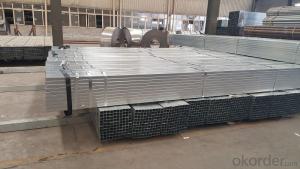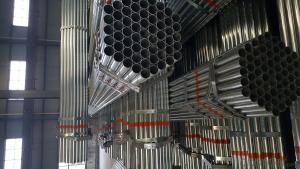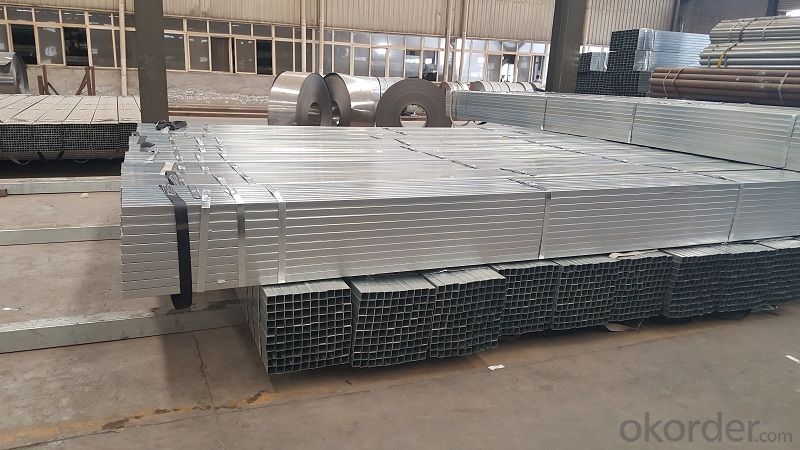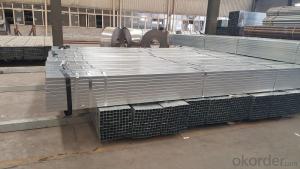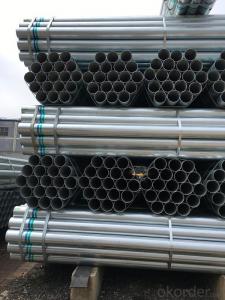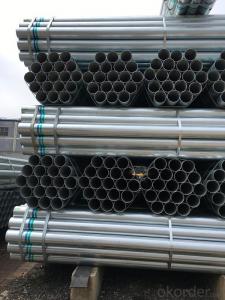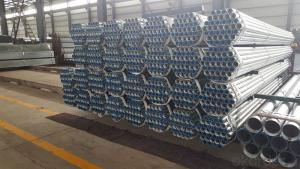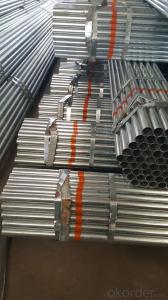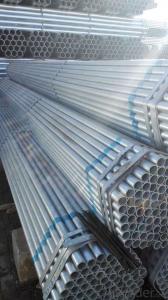Various kinds of galvanized welded steel pipe
- Loading Port:
- Tianjin
- Payment Terms:
- TT OR LC
- Min Order Qty:
- 24 m.t.
- Supply Capability:
- 15000 m.t./month
OKorder Service Pledge
OKorder Financial Service
You Might Also Like
Specification
1、Structure of Various kinds of galvanized welded steel pipe:
The surface of galvanized steel pipe welded steel pipe of hot dip galvanized layer or. Galvanized can increase the corrosion resistance of the steel tube, prolong service life. Galvanized pipe is widely used, in addition to water, gas, oil and other general low pressure fluid pipelines. It is also used in the petroleum industry, especially for offshore oil field of oil well pipe and oil pipe, chemical, coking equipment of oil heater, condensation cooler, coal run oil exchanger tube, and trestle pile, the mine tunnel support frame tube.
2、Main Features of Various kinds of galvanized welded steel pipe
• High manufacturing accuracy
• High strength
• Good visual effect
• Reasonable price
3、 Various kinds of galvanized welded steel pipe Specification:
Standard | GB, DIN, ASTM ASTM A106-2006, ASTM A53-2007 |
Grade | 10#-45#, 16Mn 10#, 20#, 45#, 16Mn |
Thickness | 1 - 33 mm |
Section Shape | Round |
Outer Diameter | 21 - 610mm |
Place of Origin | Tianjin, China (Mainland) |
Secondary Or Not | Non-secondary |
Application | Hydraulic Pipe |
Technique | Cold Drawn |
Certification | API |
Surface Treatment | factory state or painted black |
Special Pipe | API Pipe |
Alloy Or Not | Non-alloy |
Length | 5-12M |
Outer Diameter | 21.3-610mm |
Grade | 20#, 45#, Q345, API J55, API K55, API L80, API N80, API P110, A53B |
Standard | ASME, ASTM |
1) Material:Q195 Q235 Q345 X42 X52
2) Specification range:OD:21.3-610mm,WT:6-70mm,length:6-12m or according to the requirement of clients.
3) Excutive standards:GB,ASME API5L.ASTM A 106/A53,Despite of the above standards,we can also supply seamless steel pipe with standard of DIN,JIS,and so on,and also develop new products according to the requirements of our clients!
4) Surface: galvanized.
5) Ends:Beveled or square cut,plastic capped,painted.
6) Packing:bundles wrapped with strong steel strip,seaworthy packing.
4、Packaging & Delivery
Packaging Details: | seaworthy package,bundles wrapped with strong steel strip |
Delivery Detail: | 15-30days after received 30%TT |
5、FAQ of Various kinds of galvanized welded steel pipe:
①How is the quality of your products?
Our products are manufactured strictly according to national and internaional standard, and we take a test
on every pipe before delivered out. If you want see our quality certifications and all kinds of testing report, please just ask us for it.
Guaranteed: If products’ quality don’t accord to discription as we give or the promise before you place order, we promise 100% refund.
②How about price?
Yes, we are factory and be able to give you lowest price below market one, and we have a policy that “ for saving time and absolutely honest business attitude, we quote as lowest as possible for any customer, and discount can be given according to quantity”,if you like bargain and factory price is not low enough as you think, just don’t waste your time.Please trust the quotation we would give you, it is professional one.
③Why should you chose us?
Chose happens because of quality, then price, We can give you both.Additionally, we can also offer professional products inquiry, products knowledge train(for agents), smooth goods delivery, exellent customer solution proposals.Our service formula: good quality+good price+good service=customer’s trust
SGS test is available, customer inspection before shipping is welcome, third party inspection is no problem.
6、 Various kinds of galvanized welded steel pipe Images:
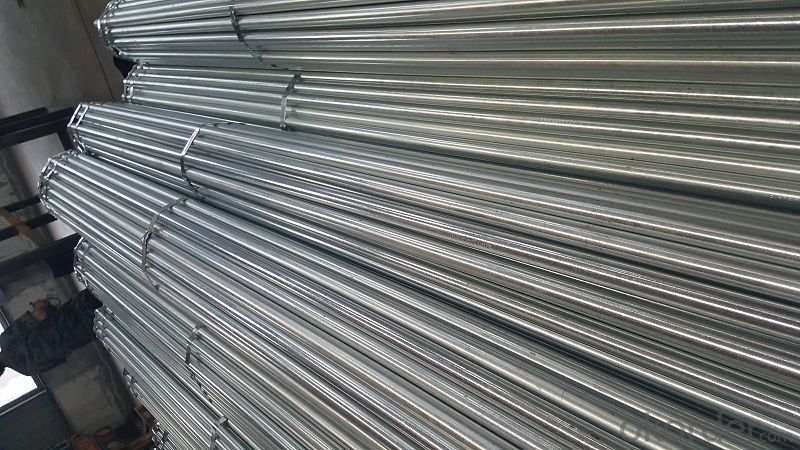
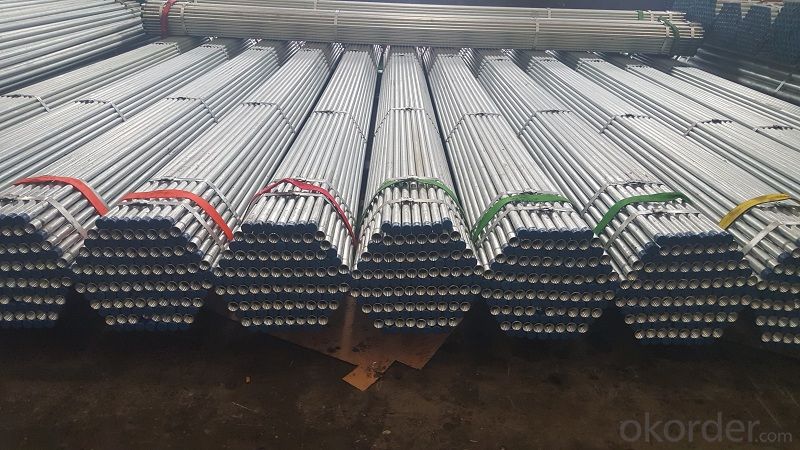
- Q: How to make the magnetic steel, can be like a magnet?
- Of course, not all materials can be magnetized, austenitic stainless steel will not do.
- Q: How do steel pipes perform in extreme temperature variations?
- Steel pipes are designed to perform well in extreme temperature variations. Due to their high tensile strength and thermal conductivity, steel pipes can withstand both high and low temperatures without significant changes in their structural integrity. However, it is important to note that extreme temperature variations may cause slight expansion or contraction of the steel pipes, which could potentially lead to minor changes in their dimensions.
- Q: How are steel pipes used in the construction of chemical plants?
- Steel pipes are commonly used in the construction of chemical plants due to their excellent durability, strength, and resistance to corrosion. They are used to transport various chemicals, gases, and fluids throughout the plant, ensuring a safe and efficient flow. These pipes are also used for structural support, providing stability to the plant's infrastructure. Additionally, steel pipes are often used for the installation of heating, ventilation, and air conditioning systems, as well as for the construction of process equipment and storage tanks within the chemical plant.
- Q: How do you calculate the stress in a steel pipe?
- When calculating the stress in a steel pipe, it is necessary to take into account the steel's material properties and the external forces acting upon the pipe. The stress in the pipe is typically determined using the following equation: Stress = Force / Area Initially, the force acting on the pipe must be established. This force may stem from external loads such as pressure, weight, or mechanical forces. The force can be calculated by multiplying the pressure or weight by the surface area it acts upon. For instance, if the pipe is subjected to internal pressure, the force can be determined using the equation: Force = Pressure x Area Subsequently, the cross-sectional area of the pipe needs to be determined. The cross-sectional area of a circular pipe can be calculated using the formula: Area = π x (Diameter / 2)^2 Once the force and area have been determined, the stress can be calculated by dividing the force by the area. This calculation will yield the stress value in units like pounds per square inch (psi) or newtons per square meter (Pa). It is important to bear in mind that the stress calculation assumes that the pipe is in a state of equilibrium and that the material properties of the steel are known. The material properties, such as yield strength and ultimate tensile strength, are utilized to ensure that the calculated stress does not exceed the steel's maximum capacity.
- Q: Can steel pipes be painted or coated?
- Yes, steel pipes can be painted or coated. Painting or coating steel pipes helps to protect them from corrosion, rust, and other environmental factors. It also enhances their aesthetic appearance and can be used to indicate the type of pipe or its function.
- Q: Seamless steel pipe and welded pipe what is the difference?
- Seamless steel pipe is made of solid round tubes and perforated without gaps. The welded pipe is made of steel or strip after welding and has a slit. Generally seamless pipe can be greater pressure on the city.
- Q: How do steel pipes handle water hammer?
- Steel pipes handle water hammer by absorbing the sudden pressure surges caused by rapid changes in water flow. The inherent strength and rigidity of steel pipes allow them to withstand the impact of water hammer without experiencing significant damage or failure.
- Q: Can steel pipes be used for conveying hazardous materials?
- Steel pipes can be used for conveying hazardous materials, as they are strong, durable, and resistant to corrosion. However, it is essential to consider the specific properties and compatibility of the hazardous material with steel to ensure safe transportation, as some chemicals or substances may react with steel or pose additional risks. Proper precautions, such as appropriate lining or coating, should be taken to minimize any potential hazards during transportation.
- Q: What are the common sizes of steel pipe fittings?
- The common sizes of steel pipe fittings can vary depending on the specific application and industry standards. However, there are several standard sizes that are commonly used across different industries. These sizes range from ¼ inch to 48 inches in diameter. Some of the most common sizes include ½ inch, ¾ inch, 1 inch, 1 ¼ inch, 1 ½ inch, 2 inch, 2 ½ inch, 3 inch, 4 inch, 6 inch, 8 inch, 10 inch, 12 inch, 14 inch, 16 inch, 18 inch, 20 inch, 24 inch, 30 inch, 36 inch, 42 inch, and 48 inch. These sizes are often available in various lengths to accommodate different installation requirements. It is important to consult industry standards and specifications to determine the appropriate size of steel pipe fittings for a specific project.
- Q: Fastener type steel pipe scaffold steel pipe wall thickness
- The scaffolding steel pipe should be specified with the current national standard "GB/T13793" or "straight seam welded steel pipe welded steel pipe for low pressure liquid delivery" GB/T3091 Q235 ordinary steel pipe; steel pipe steel quality should meet the requirements of current national standard grade Q235 steel "carbon structural steel" in GB/T700
Send your message to us
Various kinds of galvanized welded steel pipe
- Loading Port:
- Tianjin
- Payment Terms:
- TT OR LC
- Min Order Qty:
- 24 m.t.
- Supply Capability:
- 15000 m.t./month
OKorder Service Pledge
OKorder Financial Service
Similar products
Hot products
Hot Searches
Related keywords
